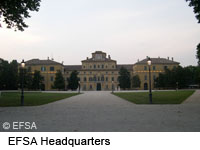EFSA rises to criticisms
The European Food Safety Authority (EFSA) launched a robust defence of its methods, and especially its impartiality in its investigation of genetically modified organisms (GMOs), on 15 May. EFSA met representatives from Member States on 15 May, and wanted to hear of any issues that the representatives may have with the methods and procedures that EFSA uses. A summary of the meeting will be published soon, but EFSA officials spoke to the press after the meeting. Dr Herman Koëter, acting Executive Director of EFSA said: 'We assess the risk or safety of food - of plants and animals in the food chain. Our mandate is limited to science. Not authorisation, not implementation. We work independently and impartially. There is no personal interest in the outcome of our decisions.' Since its formation in 2002, EFSA has studied 11 different GMOs, using panel experts from 13 Member States. The European Commission, which set up the Authority, recently imposed closer cooperation with Member States, which received a cautious welcome from the anti-GMO lobby and outright criticism from the pro-GMO lobby. EFSA must assess the risk or safety of specific GMOs within a year. They rely on field data generated by the companies that developed the GMOs. If the panel requires more information, then the clock 'stops' while the company goes back to find it. Naturally, this leads to questions of trust. Can these companies be trusted to provide accurate results? 'We rely on good lab practices that explain quality assurance,' said Dr Koëter. 'In addition, the country must monitor the institution carrying out the research. Together, this ensures that we can rely upon the pieces of information. Sometimes university studies are submitted.' Dr Harry Kuiper, has been the chair of the EFSA GMO panel since its formation in 2003. 'We compare GMO varieties with traditionally grown crops, as they are considered to be 'safe'. This is the baseline,' he said. 'The panel explains to the applicant that it must explain differences, and these differences are assessed for toxological and environmental impact. For example, if the plant expresses a novel protein - we submit this protein to a series of biomedical and toxological tests. Any such plant will be very closely studied.' Representatives from Member States had two concerns here: What about long term effects; and How does the Panel deal with uncertainty? 'The heart of the assessment is focused on long-term assessment and uncertainties,' said Dr Kuiper. 'We look at any indication of change, as toxicity tests can be applied, depending on the changes noted. Environmental assessment is 'stepwise', looking at potential effects on target and non-target organisms. Then we go to the greenhouse before field trials.' This led to a further criticism by Member States of terminology, which some found unhelpful. 'If the risk is 'negligible', this is too vague for managers, and is a difficult aspect to ascertain,' said Dr Kuiper. 'However, with our baseline, we are only able to say that a particular GMO is 'as safe as' a traditional plant.' Member States had further concerns about how EFSA then disseminates results. Member States submit questions to be answered by the panel. In the past, the panel had grouped concerns together by topic, for example - allergies. The panel agreed that now concerns will be addressed individually. Member States also wanted a specific protocol for investigating GMOs. 'We are reluctant to make a 'cook book', said Dr Kuiper. 'in case we receive a GMO application which does not fit the protocol.' Some Member States criticised the 'closed door' approach of EFSA. Panel meetings are not open, and some Member States wanted open meetings. This was rejected by EFSA. 'We already work closely with Member States,' said Dr Koëter. 'The panels are independent - this is a cornerstone of their function - and when the panel reaches consensus, this is the strength of the panel. Individuals are not important.' 'Today, political pressure should be met with scientific agreement. Before the EFSA and Member States made decisions, and there was no consensus. The EFSA should rectify this,' said Dr Koëter. 'Politics creeps into science. We cannot solve this problem, but we do as much as possible. Politicians should not try to hide political concerns behind scientific evidence,' he said.



